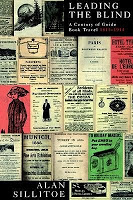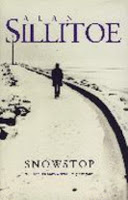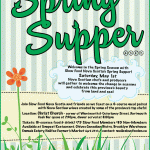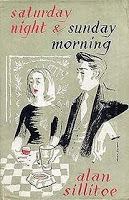 Alan Sillitoe (1928-2010) wrote novels and plays which brought attention to the plight of the poor working class in postwar England. Perhaps his most recognized book was Saturday Night and Sunday Morning in which a young factory worker (Arthur Seaton) views society as a contrast between living a raucous Saturday night life versus a sober, responsible Sunday morning life.
Alan Sillitoe (1928-2010) wrote novels and plays which brought attention to the plight of the poor working class in postwar England. Perhaps his most recognized book was Saturday Night and Sunday Morning in which a young factory worker (Arthur Seaton) views society as a contrast between living a raucous Saturday night life versus a sober, responsible Sunday morning life.
Sillitoe was born to a family of straitened means in Nottingham, England. He left school at 14 to working in a factory and then, under-aged, joined the RAF. It was during this time he contracted tuberculosis giving him the time to begin writing.
His novels gave an anti-authoritarian voice to the working class and depicted the reality of life in England after the war. As a writer he was labeled along with other so-called Angry Young Men (Philip Larkin, Kingsley Amis) and his subjects were often refered to as “kitchen sink realism” (thnk Coronation Street). Sillitoe and the other Angry Young Men rejected this name, disliking any sort of label. His novels will be remembered as, not only terrific stories, but also as works of social criticism. They were also considered groundbreaking for his use of vernacular working class dialect.
One of his later works, Birthday, revisits Arthur Seaton (of Saturday Night and Sunday Morning) as an older man. Arthur is a little mellowed by time but has not lost his fire. Sillitoe faces aging head-on not s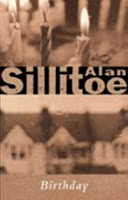 hying away from physical changes and the loss of friends. Arthur is less angry than he was in the day and has matured into a loving and compassionate parent and husband. It was a satisfying conclusion for those who were fortunate enough to read the first book when they themselves were angry young men (or women).
hying away from physical changes and the loss of friends. Arthur is less angry than he was in the day and has matured into a loving and compassionate parent and husband. It was a satisfying conclusion for those who were fortunate enough to read the first book when they themselves were angry young men (or women).
Sillitoe has left behind a large body of work which is already considered to be classics of his generation.


